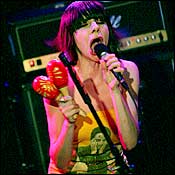
Like nervous office workers wondering what the boss might be feeling on a particular day, fans and critics of PJ Harvey struggle to gauge her mood whenever she releases a new record. It’s an understandable impulse: With her hoarse howl and her furious but conflicted brand of feminism, Harvey burst out of her small hometown of Yeovil, England, like a post-punk Medea. She even looked the part: The photo of her oceanic wave of hair on the cover of 1993’s Rid of Me seemed straight out of Greek mythology.
Harvey never kept to a single temperament. Her music was neither primal punk nor introspective blues but a more complex tangle of emotions shared by both. Unsurprisingly, all manner of outsiders—from drag queens to hipsters—saw themselves in Dry, Harvey’s debut, and Rid of Me. Back in the mid-nineties, it was hard to walk into a club and not hear a D.J. playing (or a band covering) one of Harvey’s songs; “Rid of Me” became a staple of the outré drag show Kiki & Herb, and the droning blues of “Down by the Water” was spun incessantly at the polysexual punk club Squeezebox.
But then in 2000, Harvey surprised her fans with Stories From the City, Stories From the Sea, a record that was not only unusually optimistic and romantic but offered the most tuneful and melodic songs she’d ever written.
“Harvey’s voice is an odd combination of careful, almost polite enunciation and unhinged yowl.”
Superficially, Harvey’s new album, Uh Huh Her, sounds like the return to anger many have wanted her to make: The cover features another uncomfortable close-up of Harvey, and the theme of betrayal runs through the record like a news crawl.
But the album isn’t full of fury—or really much of anything compelling. Like Sonic Youth’s just-released Sonic Nurse, Uh Huh Herb is a disappointment, the tepid, not-quite-there record that many artists seem to make after hitting a career peak. Little on Uh Huh Her takes hold. Songs like “Who the Fuck?” and “No Child of Mine” aren’t passionate enough to shake the album’s strange malaise, and Harvey’s songwriting—strong on past albums, even when she’s working within a cliché like “The Whores Hustle and the Hustlers Whore” from Stories—feels shapeless. And if the deliberately lo-fi production recalls Harvey’s earliest work, it brings us no closer to Harvey herself.
Like a particularly gruesome car wreck or the torture photos coming out of Iraq, the cover art of Earlier/Later, a two-disc set of unreleased material from Richard H. Kirk (the front man of electronic-music innovators Cabaret Voltaire), is impossible to take your eyes off. It pictures Kirk circa 1974 with a mullet (sans irony), eyes so puffy he looks like he just climbed out of a boxing ring, and a scary sneer of the loner-loser—captured with the immediacy of a Warhol Polaroid.
Harvey’s voice—that odd combination of careful, almost polite enunciation and an unhinged yowl—is still arresting, and that may be enough to move dedicated followers. One song on Uh Huh Her gives a sense of what the album could have meant to the rest of us. “Turn up the radio!” Harvey yells in “Cat on the Wall” as the music swells behind her. From the moment the song begins, we’re as pulled into it as she is to the airwaves she sings about. Like Joy Division’s “Transmission” and Van Morrison’s “Caravan,” “Cat on the Wall” connects us directly to the pleasures of listening to music. It’s too bad the rest of Uh Huh Her couldn’t do the same.
With a cover as unforgettable as this, the music could be a letdown by comparison, but it isn’t. In 33 songs, many of which were created in the mid-seventies in the basement of Kirk’s parents’ house in Sheffield, England, you can hear the template for electronic music being hammered out from lush, symphonic Detroit techno (“I Want More”), sample-packed industrial (“Do As I Do”), and staticky electro-punk (“Never Lose Your Shadow”).
As is often the case with such compendiums, though, Kirk’s ideas aren’t fully realized; the tracks are more experiments than songs. But Earlier/Later, along with 2002’s Human League compilation, The Golden Hour of the Future, proves that the Sheffield scene was shockingly ahead of its time; you find yourself checking the dates of the recordings in disbelief. At the end of the seventies, the future belonged to Sheffield kids with bruises and bad haircuts.